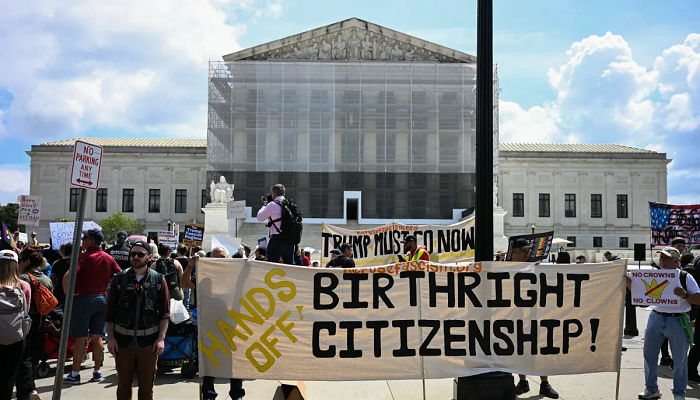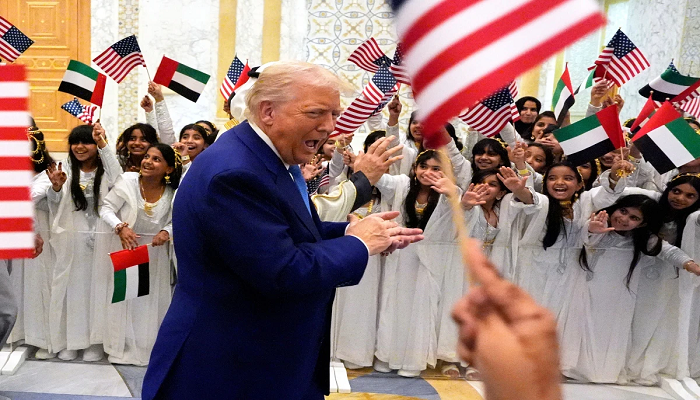The US Supreme Court deliberated on President Donald Trump’s push to limit birthright citizenship through executive order, a move that could impact thousands of U.S.-born children and redefine constitutional interpretations of the 14th Amendment.
The court’s conservative justices, who hold a 6-3 majority, seemed willing to limit the ability of lower courts to issue nationwide, or “universal,” injunctions, as federal judges in Maryland, Washington and Massachusetts did to block Trump’s directive. None of the justices, however, signaled an endorsement of Trump’s order and some of the liberals said it violates the Constitution and the court’s own precedents.
The justices heard more than two hours of arguments in the administration’s emergency request to scale back the injunctions blocking Trump’s directive, which is a key part of his hardline approach toward immigration. Three judges found that Trump’s order likely violates the Constitution’s 14th Amendment citizenship language.
US and Saudi Arabia Finalize $142 Billion Arms Deal During Trump Visit
Trump signed his order on January 20, his first day back in office. It directed federal agencies to refuse to recognize the citizenship of U.S.-born children who do not have at least one parent who is an American citizen or lawful permanent resident, also known as a “green card” holder.
Liberal Justice Sonia Sotomayor said she believes Trump’s order violates multiple Supreme Court precedents concerning citizenship. Sotomayor said the court should weigh the order’s legality “if we are worried about those thousands of children who are going to be born without citizenship papers that could render them stateless” and leave them ineligible for government benefits.
More than 150,000 newborns would be denied citizenship annually if Trump’s order takes effect, according to the plaintiffs who challenged the directive, including the Democratic attorneys general of 22 states as well as immigrant rights advocates and pregnant immigrants.
The case is unusual in that the administration has used it to argue that federal judges lack the authority to issue universal injunctions, and has asked the justices to rule that way and enforce Trump’s directive even without weighing its legal merits. Sauer focused on this issue, calling the increasing use by judges of universal injunctions a “pathology.”
In potentially restricting the ability of lower courts to issue universal injunctions in certain instances, the conservative justices raised the idea of requiring plaintiffs to funnel claims seeking broader relief into class-action lawsuits, which are filed on behalf of a group of people who suffer similar legal injuries.
Some of the conservatives also signaled that at least for the states that sued, relief might properly extend beyond their borders, as a universal injunction does.
Trump Set to Receive Luxury 747 from Qatar for Future Use as Air Force One: Source
Complicating matters, some justices – conservatives and liberals alike – also seemed reticent to rule without further delving into the underlying legal merits of Trump’s directive. It remained uncertain whether the court would order further briefing, which would further delay resolution of the case.
Conservative Justice Samuel Alito asked Kelsi Corkran, a lawyer for some of the plaintiffs, “Should we decide or make up our minds on the underlying birthright citizenship question without briefing and argument and deliberation?”

Corkran said the justices should take up the case specifically on the merits of Trump’s order, adding, “The government is asking the court to allow it to ignore this court’s precedents … and to upend 100 years of executive branch practice.”
The plaintiffs argued that Trump’s directive violated the 14th Amendment, which long has been understood to confer citizenship on almost anyone born on U.S. soil. It was ratified in 1868 in the aftermath of the Civil War that ended slavery in the United States.
The 14th Amendment’s citizenship clause states that all “persons born or naturalized in the United States, and subject to the jurisdiction thereof, are citizens of the United States and of the state wherein they reside.”
The administration contends that this citizenship language does not extend to immigrants in the country illegally or immigrants whose presence is lawful but temporary, such as university students or those on work visas.
China Issues First Rare Earth Magnet Export Permits; Volkswagen Suppliers Included
Without a universal injunction blocking Trump’s order, it could be years before the Supreme Court finally decides its constitutionality, liberal Justice Elena Kagan said.
“There are all kinds of abuses of nationwide injunctions,” Kagan told Sauer. “But I think that the question that this case presents is that if one thinks that it’s quite clear that the (executive order) is illegal, how does one get to that result in what time frame, on your set of rules without the possibility of a nationwide injunction?”
Sauer noted that after the dispute percolates in lower courts, the Supreme Court can ultimately pronounce on the legal merits of the policy, prompting conservative Justice Amy Coney Barrett to express skepticism.
“Are you really going to answer Justice Kagan by saying there’s no way to do this expeditiously?” Barrett said.
Sotomayor compared Trump’s directive to a hypothetical action by a president taking away guns from every American who owns one despite the constitutional right to keep and bear arms.
Sauer said that since Trump returned to the presidency, federal judges have issued 40 universal injunctions against his administration’s policies.
US and China to Resume Trade Talks in Switzerland on Sunday
“This is a bipartisan problem that has now spanned the last five presidential administrations,” Sauer said.
The administration is seeking to narrow the injunctions to apply only to the individual plaintiffs and the 22 states, if the justices find the states have the required legal standing to sue. That could allow the policy to take effect in the 28 states that did not sue, aside from any plaintiffs living in those states.
Jeremy Feigenbaum, the lawyer arguing for the states, said states face high and costly hurdles in managing difficulties in distributing government benefits if the order takes effect and citizenship is applied in a patchwork fashion, adding that class-action cases are “not available for state litigation.”
Feigenbaum suggested that the justices could limit universal injunctions to a narrow set of cases, including in this case where alternatives to such broad relief “are not practically or legally workable.” Conservative Justice Neil Gorsuch, a critic of univeral injunctions, expressed some agreement with Feigenbaum on that point.
Feigenbaum said the legal issue surrounding Trump’s executive order was resolved by the Supreme Court 127 years ago.
Pope Leo XIV Signals a Focus on Human Dignity, AI Challenges in First Meeting with Cardinals
An 1898 Supreme Court ruling in a case called United States v. Wong Kim Ark long has been interpreted as guaranteeing that children born in the United States to non-citizen parents are entitled to American citizenship. The administration has argued that the court’s ruling in that case was narrower, applying only to children whose parents had a “permanent domicile and residence in the United States.”
The 14th Amendment overrode an infamous 1857 Supreme Court decision called Dred Scott v. Sandford that had denied citizenship to enslaved and free Black people and helped fuel the Civil War.
“This order reflects the original meaning of the 14th Amendment, which guaranteed citizenship to the children of former slaves, not illegal aliens or temporary visitors,” Sauer told the justices of Trump’s directive.
The case is the first involving a Trump policy to be argued at the top U.S. judicial body since he returned to office, though the justices have acted on an emergency basis in several other challenges to his policies. Three of the justices were appointed by Trump during his first term as president.



